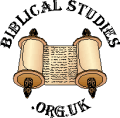This page presents all the website’s material on Exodus divided into 5 broad categories. Where there are many links, they are divided across separate pages accessible at the bottom of each tab.
The first 3 tabs divide the material broadly into Introductory, Intermediate and Advanced level documents and videos. The resources tab gives links to material relating to bibliographies, commentaries, commentary surveys and wider resources. Finally, you can also access a full alphabetical listing of the material where if you click on the title you can see the page.

Annotated Old Testament Bibliography on Exodus (Denver Seminary, 2016)
From Annotated Old Testament Bibliography – 2016 by M. Daniel Carroll R., Hélène Dallaire, and Richard S. Hess (Denver Seminary).
Cassuto, U. Commentary on Exodus. Trans. I. Abrahams. Magnes, 1967. Important for study of the Hebrew text.
*Childs, B.S. The Book of Exodus. OTL. Westminster, 1974. The application of the canonical approach to a higher critical commentary. Includes a history of interpretation for each passage.
Durham, J.I. Exodus. WBC. Word, 1987. Follows the method of Childs.
Houtman, Cornelis. Exodus. Vol. 1 (1:1-7:13). and Exodus. Vol. 2 (7:14-19:25). HCOT. Kok Pharos, 1993 and 1996. Updating of classic historical critical approach to the book.
Meyers, Carol.Exodus.NCBC. Cambridge, 2005. A readable commentary aware of both critical and literary readings and emphasizing the author’s skill in anthropological analysis of the ritual texts as well as appreciating the compositional issues in the narratives.
*Propp, William H. Exodus 1-18: A New Translation and Commentary. and Exodus 19-40: A New Translation and Commentary. AB 2A and 2B. Doubleday, 1998 and 2006. Strong on background to social institutions and customs. Important for new textual readings from the Dead Sea Scrolls.
Sarna, Nahum. Exodus. JPS Torah Commentary. Jewish Publication Society, 1991. See above for Genesis.
Stuart, Douglas K. Exodus. NAC 2. Broadman & Holman, 2006. Important Evangelical commentary with valuable exegetical insights.

From Annotated Old Testament Bibliography – 2016 by M. Daniel Carroll R., Hélène Dallaire, and Richard S. Hess (Denver Seminary).
Cassuto, U. Commentary on Exodus. Trans. I. Abrahams. Magnes, 1967. Important for study of the Hebrew text.
*Childs, B.S. The Book of Exodus. OTL. Westminster, 1974. The application of the canonical approach to a higher critical commentary. Includes a history of interpretation for each passage.
Durham, J.I. Exodus. WBC. Word, 1987. Follows the method of Childs.
Houtman, Cornelis. Exodus. Vol. 1 (1:1-7:13). and Exodus. Vol. 2 (7:14-19:25). HCOT. Kok Pharos, 1993 and 1996. Updating of classic historical critical approach to the book.
Meyers, Carol.Exodus.NCBC. Cambridge, 2005. A readable commentary aware of both critical and literary readings and emphasizing the author’s skill in anthropological analysis of the ritual texts as well as appreciating the compositional issues in the narratives.
*Propp, William H. Exodus 1-18: A New Translation and Commentary. and Exodus 19-40: A New Translation and Commentary. AB 2A and 2B. Doubleday, 1998 and 2006. Strong on background to social institutions and customs. Important for new textual readings from the Dead Sea Scrolls.
Sarna, Nahum. Exodus. JPS Torah Commentary. Jewish Publication Society, 1991. See above for Genesis.
Stuart, Douglas K. Exodus. NAC 2. Broadman & Holman, 2006. Important Evangelical commentary with valuable exegetical insights.

Comments on Commentaries
An assessment of commentaries on a book of the Old & New Testament to keep you up to date with what will help in preaching and teaching in the local church.
OT: Exodus
Finally the long-prevailing scholarly preoccupation with source criticism in the Pentateuch has given way. Whilst the nature, scope and dating of the sources has been fascinating and illuminating for the study of Exodus, there is now wider interest (and opinion) in the way in which the differing materials have come together into the present book. If there ever was a source-critical consensus, then it has passed, and so have the commentaries that seek to find it – A H McNeile (Westminster, 1908; 3rd ed 1931), S R Driver (Cambridge, 1911), J P Hyatt (NCB, 1971; 1980 rev ed) – hallelujah!
Meanwhile, the debate has moved from source criticism to form criticism and on to the new literary criticism. The magisterial commentary of B S Childs (OTL, 1974) has become a landmark: not only in the study of Exodus but in the style of commentaries. This satisfies the demand for an exegesis that is both rigorous in its use of critical tools and committed to a discernment of the theological dimension of the texts. The heavy shelf need heave no further if you would own just one serious commentary.
Equally serious though more geared to the needs of the preacher is T E Fretheim (Interpretation, 1991). This attempts to do justice to both realities in Exodus – to our knowledge of its pre-Christian roots and to our experience of hearing it as a genuinely Christian word – without necessarily forcing the two-step process of ‘description-application’. Given the kerygmatic nature of Exodus, the two worlds merge naturally. Fretheim also enjoys the structure of the whole, noting various verbal, thematic and literary links. Not many commentaries make a good read – as opposed to a good reference – but this is certainly one of them.
Other ‘general’ recommendations would include R E Clements (Cambridge; CBC, 1972), H L Ellison (DSB, 1982) and J I Durham (Word, 1987). These are good and thorough, but not exciting: they tend to represent basic information in traditional ways. One last recommendation, which is exciting, would be G Larsson (Bound for Freedom, Hendrickson, 1999) who fruitfully brings together Jewish and Christian interpretation: you will not forget his exposition of God’s giving of the law at Sinai.
Revd Dr Jo Bailey Wells, Clare College, Cambridge

The central and defining narrative memory of biblical faith is the story of the Exodus. While popular religion is preoccupied with the great divide of water in the Exodus story, in fact this defining memory is not about water; it is about rescue from unbearable poverty and abuse in debt slavery.
Full article at http://thewitness.org/archive/may2002/entitledneighbors.html









